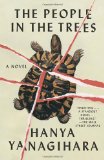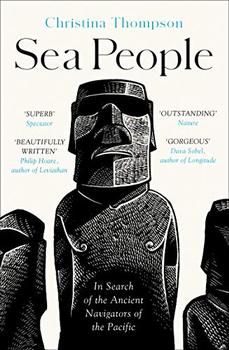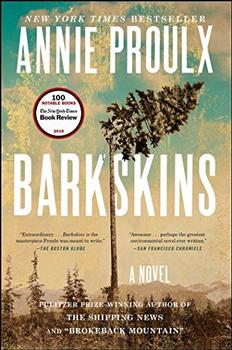Summary | Excerpt | Reviews | Beyond the book | Read-Alikes | Genres & Themes | Author Bio

Critics' Opinion:
Readers' Opinion:
First Published:
Aug 2013, 384 pages
Paperback:
May 2014, 496 pages
 Book Reviewed by:
Book Reviewed by:
Amodini Sharma
Buy This Book
The People In the Trees contemplates the cost of scientific discovery – and its effects on society as a whole. The primary character, Dr. Abraham Norton Perina (who is roughly modeled after the real-life Nobel Laureate Daniel Carleton Gajdusek) is a renowned scientist and a recipient of the Nobel Prize in medicine. His professional achievements notwithstanding, Perina has been convicted of raping and sexually assaulting his adopted children, a fact we come to know early on.
The reader learns of Perina's life history through his memoirs, which are presented by a close friend and associate, Dr. Ronald Kubodera. Kubodera writes a preface to the memoirs and embellishes his friend's words with technical footnotes. Viewing a life through two prisms, the reader is left to decide whether Perina is a good man who was simply misunderstood, or a criminal getting his just deserts.
The son of lax parents, for whom he holds a controlled contempt, Perina grows up in Lindon, Indiana, "an unremarkable rural town." A young doctor at Harvard Medical School in 1950, subject to the pitiful politics of the research lab, he is afforded the opportunity to do something new: Stanford anthropologist Paul Tallent is heading an expedition to the remote fictional Micronesian island of U'ivu in search of a long-lost tribe, and Perina is invited to accompany the expedition as a medical recorder/sample-taker. He jumps at the chance to do some actual research and accompanies Tallent and his associate Esme Duff into, literally, uncharted territory. In due course Perina comes across evidence that could hold the secret to longevity. We learn about the "dreamers" - people who eat a special kind of turtle meat when they turn 60 and then live on well past 100 (albeit with diminished mental faculties). The potential large-scale application of this discovery could have huge ramifications for the relatively sheltered tribes of U'ivu.
The wonders of new worlds are enticing – and make for an engrossing page-turner when they are described in minute, mesmerizing detail as Yangiraha does. In The People In the Trees, we are transported from the clinical, sterile environment of the research laboratory where Perina works, to the lush green environs of the untouched wild. Such is Yanagihara's power over the written word that the journey is vivid and atmospheric; we are with the expedition every step of the way. Perina himself comes across as practical and pragmatic, although self-absorbed and strongly focused on his personal goals.
The book seems to divide into two parts – one details Perina's adventures into U'ivu and the other tells us about events after he first returns, and the impact of his findings on the Ivu'ivuans and Perina himself. This second phase assumes a more personal tone, dealing with Perina's family life and the many children he adopts from the island, one of whom accuses him of sexual abuse.
The author narrates anecdotes – minor and major – to help flesh out her characters. No word, no glance, no nuance is ever without meaning. Each little incident adds another facet to the picture we build in our minds. Whether it be the one where Perina describes an evening spent with Gregory Smythe, his supercilious superior at Harvard, or the one about the Ivu'ivuan coming-of-age ceremony and the reactions it provokes in Tallent's team, each event serves a purpose. Yanagihara drops subtle little hints throughout the book, and it is her skill as a wordsmith and storyteller that made me read on.
This smooth-flowing, anthropological novel is an impressive debut – a book that lingers in one's mind. When all is said and done, it makes us contemplate the benefits and evils of scientific conquest. What price discovery? When knowledge comes at a cost, who pays it and how do we justify it, if at all? This is also a tale of moral relativism, of differences in cultures and perspectives, and outlines precisely the very thin line separating gestating thought from evil action.
![]() This review was originally published in The BookBrowse Review in September 2013, and has been updated for the
May 2014 edition.
Click here to go to this issue.
This review was originally published in The BookBrowse Review in September 2013, and has been updated for the
May 2014 edition.
Click here to go to this issue.

If you liked The People in the Trees, try these:

by Christina Thompson
Published 2020
A blend of Jared Diamond's Guns, Germs, and Steel and Simon Winchester's Pacific, a thrilling intellectual detective story that looks deep into the past to uncover who first settled the islands of the remote Pacific, where they came from, how they got there, and how we know.

by Annie Proulx
Published 2017
From Annie Proulx - the Pulitzer Prize- and National Book Award - winning author of The Shipping News and Brokeback Mountain, comes her masterwork: an epic, dazzling, violent, magnificently dramatic novel about the taking down of the world's forests.





The Funeral Cryer by Wenyan Lu
Debut novelist Wenyan Lu brings us this witty yet profound story about one woman's midlife reawakening in contemporary rural China.
Your guide toexceptional books
BookBrowse seeks out and recommends the best in contemporary fiction and nonfiction—books that not only engage and entertain but also deepen our understanding of ourselves and the world around us.